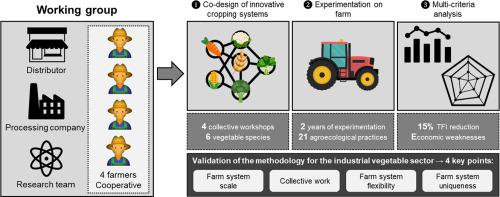Agricultural Systems ( IF 6.1 ) Pub Date : 2021-04-26 , DOI: 10.1016/j.agsy.2021.103153 Camille Puech , Arnaud Brulaire , Jérôme Paraiso , Vincent Faloya

|
CONTEXT
There is an urgent need to reduce the use of phytosanitary products in industrial vegetables due to environmental and health concerns. However, as in many industrial sectors, vegetables production is characterised by strong constraints related to the expectations of consumers, the profitability of distributors and the processing steps of industrial companies. These constraints impact farming systems through the elaboration of production contracts that hamper innovation and reduce farmers' latitude to evolve toward agroecology.
OBJECTIVE
This study was initiated by a French distributor of frozen products, and aimed to create innovative agroeocological cropping systems by circumventing lock-ins of the sector thanks to a co-design methodology.
METHODS
An existing methodology of innovative cropping systems design for fresh vegetable crops was adapted to the context of industrial production, considering the 3-year deadline granted to the project. Four farmers were involved, who were part of a working group consisting of a distributor, a processing company, a cooperative and a research team, all involved in the production of frozen vegetables. Four cropping systems were designed, consisting in combinations of agroecological farming practices, and tested on farm for two years.
RESULTS AND CONCLUSIONS
Farmers reduced their Treatment Frequency Index by 15% on average, thanks to the combination of a wide range of agroecological farming practices. A multi-criteria analysis showed that there was no clear improvement in overall cropping system sustainability, due to economic weaknesses. Although these results were somewhat disappointing, especially with respect to the expectations of public policies, they represent a significant progress given the difficulty to reduce the use of chemical pesticides in industrial systems. Farmers underlined the importance of economic security but were nevertheless highly motivated to continue the transformation of their systems, and the working group collectively approved the methodology. Four methodological aspects are discussed, identified as key elements for consideration in this type of study: farm system scale, collective work, farm system flexibility, and farm system uniqueness. Based on these principles, the working group decided to extend the study to a larger scale, with the aim of recruiting more farmers from the sector.
SIGNIFICANCE
This study shows that making cropping systems with industrial vegetables evolve toward agroecology is possible thanks to a co-design methodology. In the long term, such initiatives could support the transition of the whole agrifood system toward the production of healthier products, reducing negative environmental impacts of cropping systems.
中文翻译:

工业蔬菜领域创新性农业生态种植系统的总体设计
语境
由于对环境和健康的关注,迫切需要减少在工业蔬菜中使用植物检疫产品。但是,与许多工业部门一样,蔬菜生产的特点是与消费者的期望,分销商的盈利能力以及工业公司的加工步骤相关的严格限制。这些制约因素通过制定生产合同而影响了耕作制度,从而阻碍了创新并降低了农民向农业生态学发展的自由度。
客观的
这项研究是由法国冷冻产品分销商发起的,旨在通过共同设计方法来避免该行业的束缚,从而创建创新的农业生态种植系统。
方法
考虑到该项目的最后期限为三年,现有的新鲜蔬菜作物创新种植系统设计方法已根据工业生产进行了调整。涉及了四个农民,他们是一个工作组的一部分,该工作组由一个分销商,一家加工公司,一个合作社和一个研究团队组成,所有团队都从事冷冻蔬菜的生产。设计了四种耕作系统,结合了农业生态耕作方法,并在农场进行了两年的测试。
结果与结论
由于多种农业生态农业实践的结合,农民平均将其治疗频率指数降低了15%。一项多标准分析表明,由于经济疲软,总体种植系统的可持续性没有明显改善。尽管这些结果有些令人失望,尤其是在公共政策方面,但由于难以减少工业系统中化学农药的使用,它们代表了重大进展。农民们强调了经济安全的重要性,但仍然极有动力继续其系统的转型,因此工作组集体批准了该方法。讨论了四个方法论方面,确定为此类研究中要考虑的关键要素:农场系统规模,集体工作,农场系统的灵活性和农场系统的独特性。基于这些原则,工作组决定将研究范围扩大到更大范围,目的是从该部门招募更多的农民。
意义
这项研究表明,借助共同设计的方法,可以使具有工业蔬菜的农作物系统向农业生态系统发展。从长远来看,这些举措可以支持整个农业食品系统向更健康产品的生产过渡,减少种植系统对环境的负面影响。











































 京公网安备 11010802027423号
京公网安备 11010802027423号